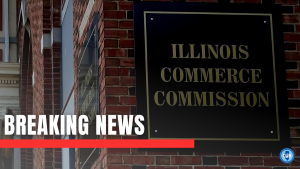
As CUB prepared to argue that state regulators should cut Commonwealth Edison’s $678 million rate-hike request, the consumer group has identified hundreds of millions of dollars in excessive spending proposed by Illinois’ largest electric utility. (Read the full CUB news release from Tuesday, Nov. 19.)
“We urge the Illinois Commerce Commission (ICC) to remove wasteful and improper spending by ComEd in its multi-year rate plan,” CUB Executive Director Sarah Moskowitz said. “Illinois’ largest electric utility is required by law to prove that its grid plan is affordable—they don’t get a blank check.”
Oral arguments in the ComEd rate case (Docket 24-0181) were scheduled for Tuesday morning, Nov. 19 (CUB General Counsel Eric DeBellis participated.) The ICC’s final order in the case is expected Dec. 5.
It’s the latest in what has been a sometimes dramatic series of developments for ComEd in recent years before the ICC. In 2022, after an investigation sparked by the Climate and Equitable Jobs Act (CEJA), the ICC ordered ComEd to pay a $38 million fine in connection with its corruption scandal. (ComEd was fined $200 million by federal authorities in 2020, after admitting to a bribery scheme to pass legislation that implemented a “formula rate” system and hundreds of millions of dollars in rate hikes over a decade.)
CEJA, the groundbreaking clean energy legislation passed in 2021, scrapped the old formula rates, and implemented a new system in which ComEd proposed a four-year plan for investing in the grid. The utility has to prove that the plan would be affordable and beneficial to customers.
Last December, the ICC rejected the utility’s first proposed grid plan for, among other things, failing to prove affordability, and slashed its proposed four-year rate hike. Earlier this year, ComEd refiled its grid plan and proposed a less enormous, but still significant, series of rate hikes through 2027.
Over the course of the case (Docket 24-0181), the proposed rate hike has been adjusted, and it now stands at about $678.1 million, according to a recent ComEd filing. State regulatory judges in October issued a Proposed Order recommending a total rate hike of about $648.6 million. This is on top of $506 million in higher rates the ICC approved last December, regarding issues regulators considered separately. Put together, ComEd’s annual rates would increase by about $1 billion.
In expert testimony filed this past summer, CUB recommended the ICC reduce ComEd’s rate hike by at least $89 million, and reject hundreds of millions of dollars more in wasteful or improper spending ComEd planned to recover in decades to come. A summary of key parts of CUB’s testimony:
- CEJA requires proving cost-effectiveness for each project included in ComEd’s grid plan. But ComEd only applied cost-benefit analysis to projects representing roughly one-fourth of total costs, CUB argued. The watchdog proposed requiring ComEd to calculate benefits for every project it can and compare that to costs. Projects would only be approved if benefits exceed costs, or if they’re strictly legally or practically required.
- CEJA requires that delivery service rates be affordable. But ComEd misled about its huge rate-hike request by comparing delivery service rate increases to total electric bills, or even total household energy costs (including volatile heating gas costs). CUB argued that by dividing the relevant number by a larger category of costs, the utility made its proposed rate hike look smaller than it actually was and tried to skirt CEJA. CUB proposed that the ICC compare apples to apples and, if delivery service rates under the proposed grid plans would grow too fast relative to forecasted inflation, decrease ComEd’s rate hike accordingly to slow the rate of spending.
- CUB urged regulators to make utility shareholders, not customers, foot the $5.4 million bill for outside law firms and consultants to argue in favor of ComEd’s grid plan after its first attempt was deemed inadequate by the ICC last December.
- CUB argues that the ICC should disallow about $29.5 million in additional IT expenses stemming from ComEd’s botched rollout of its new customer billing system, which resulted in customers’ bills being delayed or incorrect, and Community Solar subscribers not receiving bill credits, for several months. CUB says customers should not pay for ComEd’s mistakes. (This issue was the subject of a front-page Chicago Tribune story, after CUB put out a news release about it.)
- CUB challenges ComEd’s request that the ICC pre-approve more than $665 million in spending to serve new large customers based on speculative projections that massive data centers will be built. This would represent a 50 percent increase from the more typical new-business growth estimates the ICC approved last December. If ComEd’s estimate is wrong, customers will shoulder the costs of unnecessary system upgrades. About $430 million of this amount is for data centers, projects that have been especially prone to delay or cancellation. CUB argues that instead of basing rates on guesswork and unrealistic assumptions, CEJA has a process for adding such costs to rates afterwards, if they arise.
“Under CEJA, the days of spending customers’ money first and answering questions later are over,” said CUB General Counsel Eric DeBellis, who took part in oral arguments. “ComEd must prove that each investment of ratepayers’ money is strictly necessary or yields real, tangible ratepayer benefits that exceed costs, or both. Our job is to challenge ComEd and keep them from playing fast and loose with everyone’s money.”

